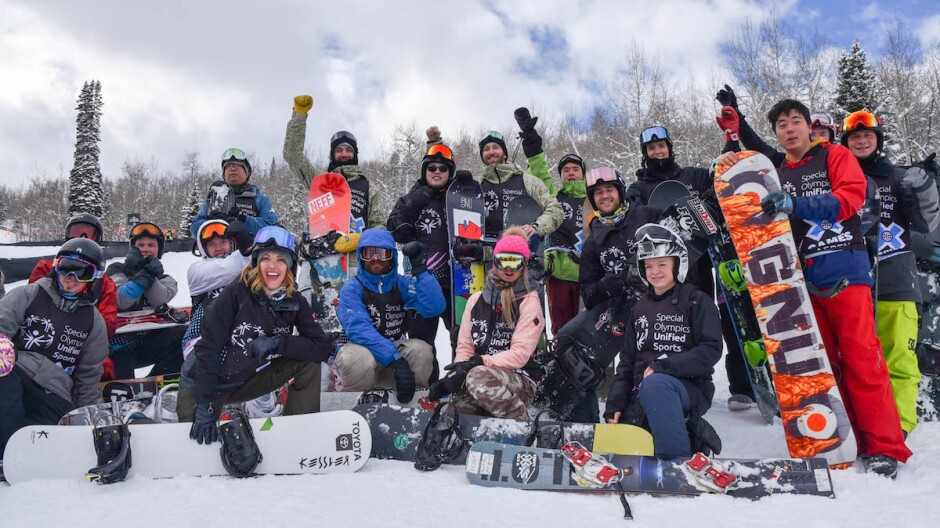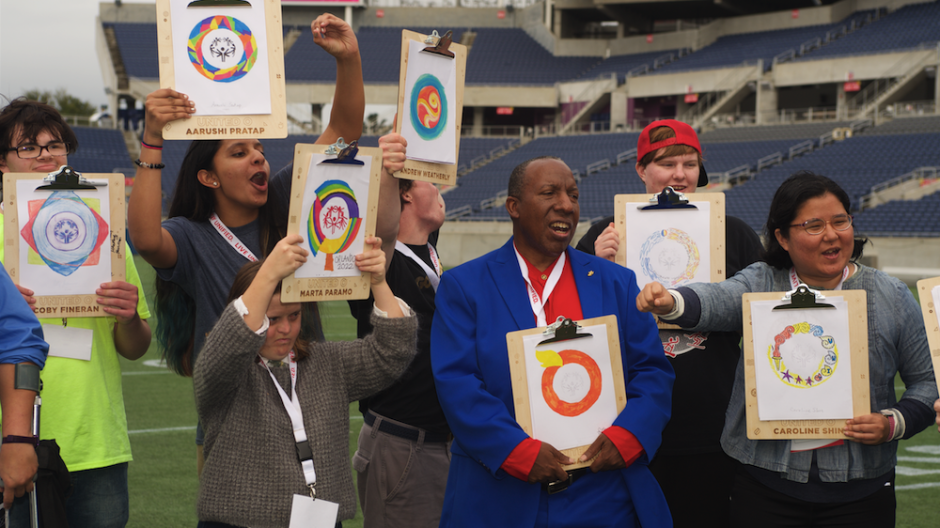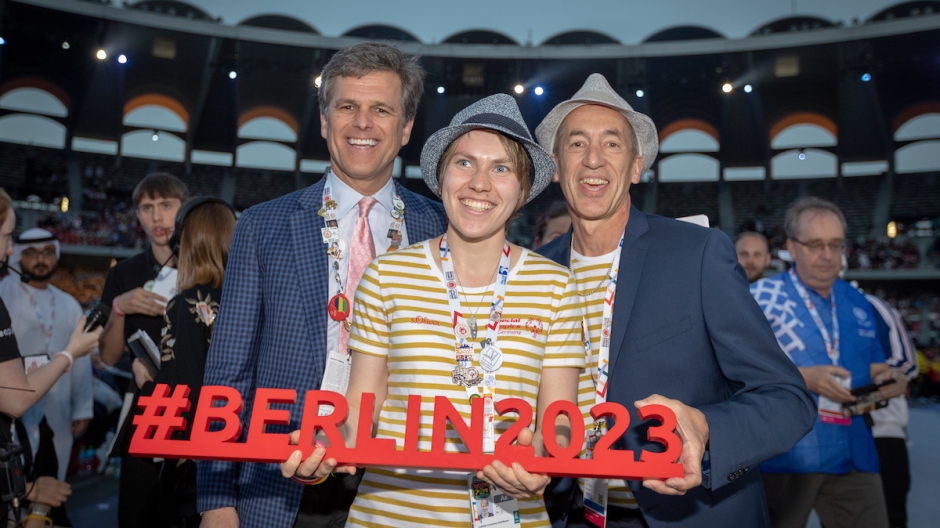Beyond the record-breaking week-long World Games in Abu Dhabi, Special Olympics held nearly 115,000 sports competitions around the world in 2019, averaging 315 per day, 13 per hour.
These include more than 31,000 Unified Sports competitions –- a 19% jump in just one year!
Power of Unified: In 2019, Special Olympics Unified Sports hit a new milestone: nearly 1.9 million people – with and without intellectual disabilities –- playing together and learning from each other through inclusive sports, worldwide. This includes more than 909,000 athletes and 968,000 Unified partners.
As everyone knows, the power of youth magnifies the power of unified—today and into the future. Our Unified Youth now number 690,000 teammates, all between the ages of 8-25. The empowering example of inclusion is also making an impact on our youngest athletes: in 2019, the Young Athletes sports program – for children ages 2-7, with and without ID – grew by 32% around the globe.
Coaches: Our Sports programming is led by more than 524,000 coaches globally (an increase of 5% since 2018). In 2019, the number of certified coaches also grew – by 4% worldwide!
Partnerships: Our sports work is supported by 747 global partnerships around the world, including the Asian Football Confederation and Major League Soccer (MLS), among many, many others. Our partnerships also help us expand our sports offerings -- as we did in 2019 by formally adopting DanceSport and Competitive Cheer as recognized Special Olympics sports. This growth happened thanks to partnerships with the World DanceSport Federation and the International Cheer Union.
In 2019, Special Olympics also announced a partnership with the International Basketball Foundation; the goal is to increase participation in basketball for youth at the local Program level through 3x3 and mini-basketball.
Innovative Sports for Everyone
Beach Games
In 2019, Special Olympics Unified Beach Games jumped to even higher heights! Unified Beach Games have offered Programs and athletes access to outdoor competitions in spaces that require no building structures and little equipment. This allows more athletes more opportunities to experience Special Olympics sport, competition, and programs.
Trinidad and Tobago
Home of the first Special Olympics Unified Beach Games held in 2016, Special Olympics Trinidad and Tobago continued in 2019 with its 4th annual Unified Beach Games located on Las Cuevas Beach. More than 175 athletes, coaches, and volunteers took part with athletes and Unified partners competing in open water swimming, beach volleyball, beach football (soccer), beach bocce, beach powerlifting, and an aquathlon.
Coaching clinics provided coaches training on how to best prepare athletes to compete in various beach sports in international competitions. Additionally, Special Olympics ambassador Bob Beamon, U.S. Olympic long-jump record holder, hosted a reception to kick off the event.
Serendib
Special Olympics Serendib hosted its 2nd Special Olympics Asia Pacific Unified Beach Carnival at Negumbo Beach, where more than 120 athletes and Unified partners from across Sri Lanka and Bangladesh competed in beach cricket and beach netball. They were joined by families, caretakers, supporters, and key dignitaries such as the Mayor of Negumbo.
Italy
Special Olympics Italy hosted the first-ever Special Olympics Unified Beach Games to be held in the Europe Eurasia region. More than 150 athletes and partners from 10 Italian regions participated in high-level competition in open water swimming, beach volleyball, beach football (soccer), and beach bocce. The Games took place over three days on the beaches of Cesenatico.
Even More Innovative Sports for All

With the support of the European Union Erasmus+, the Special Olympics 'Keep Up With the Girls' campaign took football pitches across Europe by storm! The goal: to get women and girls — with and without intellectual disabilities — involved in football (soccer).
This clarion call for inclusion was timed around the FIFA Women’s World Cup. The “Keep Up With the Girls” campaign promoted a ‘football for all’ message across 20 European countries. Thanks to wide media overage — plus support from luminaries like singer Nicole Scherzinger, supermodel and philanthropist Natalia Vodianova and legendary footballers Didier Drogba and Cafu — “Keep Up With the Girls” changed attitudes about the sports talents of Special Olympics athletes. The campaign also sent a powerful message encouraging women and girls to reach their full potential, regardless of their backgrounds or abilities.
... And for All Abilities
The Special Olympics Motor Activity Training Program (MATP) works with children and adults with intellectual disabilities who otherwise might not be engaged in sports, especially those with multiple disabilities. These adapted physical activities offer opportunities for success--and fun!!
Throughout 2019, MATP continued to grow across the global Special Olympics movement, with exciting accomplishments, including:
- A MATP demonstration at the 2019 World Games in Abu Dhabi that included 36 athletes from local organizations and centers. Athletes demonstrated their many skills for their families, spectators and honored guests.
- The East Asia and Europe Eurasia Regions held Regional MATP seminars to train MATP head coaches, who returned to their home countries to train even more MATP coaches. These trainings will increase needed opportunities for MATP athletes in communities throughout these Regions.
- A new MATP Global Advisory Committee was formed, chaired by Dr. Eleni Rossides, Special Olympics International Board Member and Global MATP Advisor. This Committee met for the first time in Singapore in May to discuss updates to MATP resources, share best practices from different Regions, and provide recommendations on the strategic direction of MATP.
The Best Coaches in the World
Sports & Coaching in the Time of Covid
In 2020, on-site coach training opportunities were limited, yet Special Olympics was able to utilize a virtual model. More than 10,000 coaching and fitness courses were completed through SOI’s online Learning Management System and a framework for a regional Coach Developer System was created for Special Olympics Asia Pacific.
Engagement strategies with international sport federations yielded an increase in national level sport partnerships of 35 percent. This will greatly assist our programs to emerge from COVID with added capacity and resources to help every athlete realize the physical, social and mental well-being and benefits of sport training and competition.
Yet another example of global innovation was the inauguration of virtual games and competitions, enabling athletes from around the world to experience the joy of sports from the safety of their homes.
COVID contingency plans were also successfully put into place with both the 2022 World Winter Games and 2023 World (Summer) Games Local Organizing Committees. Meanwhile, planning continued for the 2nd edition of the Special Olympics Unified Cup, which was awarded to Michigan, USA.
In addition, we increased our audience engagement by sharing stories of how our athletes have boldly faced opportunities and challenges both on and off the field through the confidence and skills they continued to develop through virtual sports programming. This included a major milestone as Chris Nikic, a Special Olympics Florida athlete, became the first person with Down syndrome to complete an IRONMAN.
This story and many others featured in highly coveted outlets and channels helped to keep Special Olympics’ sports programming front and center with decision makers, volunteers such as coaches, community leaders and, of course, people with intellectual disabilities.
In 2021, Special Olympics Sport and Competition continued efforts to digitize educational resources, including the conduction of a Global Coach Webinar series, development of an online data sharing platform for our sport specific resource teams, and creation of an e-learning technical delegate education module. Over 4,800 individuals representing over 120 countries registered for the Global Coach Webinar series. 39% of the attendees were from outside organizations indicating the Series contributed to a broader coach recruitment effort while influencing other organizations to promote inclusion for individuals with ID.
In preparation for post pandemic re-activation, a new format was finalized for operating and presenting our World Games competition -- a set of Sport Impact Standards for priority sports. These sport impact standards will provide Special Olympics athletes with an optimum environment to perform at their best, while creating a a pathway for inspiring sport story content. Additionally, through our sport partnership work, we launched a Training Pledge program with the Badminton World Federation (BWF) focused on national federation training support for Special Olympics athletes attending the World Games in 2023. This precedent-setting support from an international sport federation will ensure Special Olympics athletes will receive the very best training assistance possible while further integrating individuals with intellectual disabilities into mainstream federation work at the national level.


















